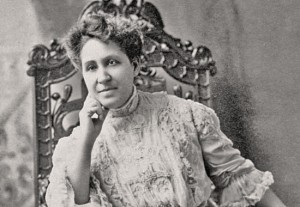The Hidden History of Black Women Criminal Legal Reformers…
Quick, name a 19th or early 20th century Black woman criminal legal system reformer…
It’s likely that if any name comes to mind at all, it might be Ida B. Wells-Barnett who I like to write quite a bit about on the blog. As someone who is very interested in the history of criminal legal reform, I have to admit to not coming across much documentation about black women’s contributions to the movement for criminal legal reform in the 19th and early 20th centuries.
 One notable example is Mary Church Terrell. Born in 1863 to former slaves, Ms. Terrell is perhaps best known as an educator and as the first president of the National Association of Colored Women’s Clubs. Her father became very wealthy and is sometimes credited with being the first black millionaire. She studied at Oberlin College and first earned her bachelor’s in 1884 then a master’s degree in 1888. She was one of the first black women to earn a college degree.
One notable example is Mary Church Terrell. Born in 1863 to former slaves, Ms. Terrell is perhaps best known as an educator and as the first president of the National Association of Colored Women’s Clubs. Her father became very wealthy and is sometimes credited with being the first black millionaire. She studied at Oberlin College and first earned her bachelor’s in 1884 then a master’s degree in 1888. She was one of the first black women to earn a college degree.
All of these accomplishments are impressive and don’t even begin to cover her contributions to women’s and civil rights. However, what has always captured my attention and garnered my deepest respect is the legacy of Ms. Terrell’s advocacy against the convict lease system. In 1907, she published an important article titled “Peonage in the United States: The Convict Lease System and the Chain Gangs” in a journal called “The Nineteeth Century.” In the essay, she suggests that leasing is a “modern regime of slavery.” She contends that Georgia was the worst culprit in terms of the brutality and violence of its lease system. She repeatedly cites Colonel Alton’s Byrd’s investigation of the Georgia Convict Camps. It’s much better to read her own words than my interpretation of them so I offer some excerpts from her essay. She opens with these words:
“In the chain gangs and convict lease camps of the South to-day are thousands of coloured people, men, women, and children, who are enduring a bondage, in some respects more cruel and more crushing than that from which their parents were emancipated forty years ago. Under this modern regime of slavery thousands of coloured people, frequently upon trumped-up charges or for offenses for which in a civilised community would hardly land them in gaol*, are thrown into dark, damp, disease-breeding cells, whose cubic contents are less than those of a good-sized grave, are overworked, underfed, and only partially covered with vermin-infested rags. As the chain gangs and convict lease system are operated in the South to-day they violate the law against peonage, the constitutionality of which was affirmed by the Supreme Court two years ago (p.306).”
In another part of the essay, she addresses how black people find themselves unjustly swept up in the lease system:
“Colored men are convicted in magistrates’ courts of trivial offenses, such as alleged violation of contract or something of the kind, and are given purposely heavy sentenced with alternative fines. Plantation owners and others in search of labour, who have already given their orders to the officers of the law, are promptly notified that some available labourers are theirs to command and immediately appear to pay the fine and release the convict from gaol only to make him a slave. If the negro dares to leave the premises of his employer, the same magistrate who convicted him originally is ready to pounce down upon him and send him back to gaol. Invariably poor and ignorant, he is unable to employ counsel or to assert his rights (it is treason to presume he has any) and he finds all the machinery of the law, so far as he can understand, against him. There is no doubt whatever that there are scores, hundreds perhaps, of coloured men in the South today who are vainly trying to repay fines and sentences imposed upon them five, six or even ten years ago. The horror of ball and chain is ever before them, and their future is bright with no hope (p.308).”
These are just a couple of excerpts that I wanted to share as a way to illustrate the passion with which she writes about the injustice of leasing. You can read her entire essay online thanks to Google Books here.
*A gaol is a jail.
